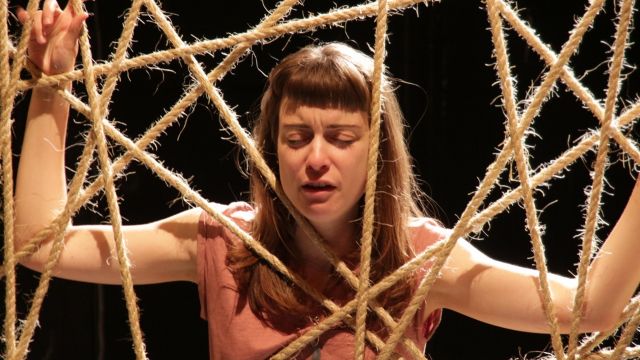Atlanta
The Bakehouse Theatre (former the Red Shed) is one of the most important and vital performing spaces in Adelaide. Led by Australian theatre ‘legends’ Peter Green and Pamela Munt, it has an illustrious theatre history that spans centuries – literally.
Whilst fully supportive of Bakehouse Theatre, particularly in its drive to establish a much-needed second permanent professional theatre company in Adelaide, nonetheless, I find myself in a quandary. I unconditionally support Bakehouse, yet with the current production of Atlanta I was a little disappointed.
Is this production worth seeing, and paying the price of admission? Absolutely yes! It is by Joanna Murray-Smith, one of Australia’s best contemporary playwrights. Furthermore, this production has been excellently produced and directed by noted Adelaide theatre artist Joh Hartog. The production is stylish, well paced, beautifully lit, and seamless in the presentation of the respective scenes and complicated narrative.
My concerns lay primarily with the quality of the acting and the characterisation, or lack of, by the ensemble of actors. Whilst undeniably the ensemble is full of talented individuals, unfortunately there is a profound lack of skill, technique and detail in their work.
 Atlanta is an early play by Joanna Murray-Smith, dating from 1990. This production is not specifically set in 1990, or the 1980s for that matter, but with vital references to films such as The Deer Hunter and The Big Chill it cannot escape its original period. As with most of Joanna Murray-Smith’s plays, the respective characters are a group of highly intelligent, intellectual, and successful individuals. They are members of a Melbourne upper middle class, and in many ways are distinctly ‘Melbourne’. This production has attempted to make the given circumstances of the play and its characters more universal, and to some extent it is successful, but overall it is not.
Atlanta is an early play by Joanna Murray-Smith, dating from 1990. This production is not specifically set in 1990, or the 1980s for that matter, but with vital references to films such as The Deer Hunter and The Big Chill it cannot escape its original period. As with most of Joanna Murray-Smith’s plays, the respective characters are a group of highly intelligent, intellectual, and successful individuals. They are members of a Melbourne upper middle class, and in many ways are distinctly ‘Melbourne’. This production has attempted to make the given circumstances of the play and its characters more universal, and to some extent it is successful, but overall it is not.
As with other Joanna Murray-Smith plays and characters it deals with these very smart and articulate intellectuals being faced with an emotional challenge in which their intellect is of no help in understanding the irrational. In this case it is the issue of suicide – very Big Chill. It is a journey – in Jungian terms – from ‘Thinking’ to ‘Feeling’. Sadly, in this production, one does not go on this journey. The entry point from the very beginning is ‘feeling’ based, and there it remains. Subsequently, by the end of this play, whilst sincerely played by the respective actors one felt nothing.
The acting was sincere, but that’s all it was; lacking in detail and lacking in a dynamic physical and vocal dynamic range of expression – it was all pretty much one-note acting; committed, but dull. The characters were emotional types from the very beginning; there was no discovery of feeling. They were all ‘nice’ and full of ‘feel sorry for me’ attitudes. This play and its characters are much tougher intellectually than this production allows. I simply didn’t believe that these were members of an elite class, that had easy access to a holiday house in Lorne, especially as they were dressed and essentially behaved as modern day bogans.
Furthermore, the actors were lacking in being physically and vocally centred. They were not in control of their bodies. This was most clearly demonstrated in a sloppy physical life that was basically the same in each scene – no journey – no change. There was no real ‘arch’ in regards to the respective characters’ journeys. Their vocal delivery was basically all ‘head voice’, partly caused by severe physical tension – locked knees, sagging physical centres, thrusting heads. In ‘Alexander’ terms their bodies were cut in two, with the upper body dominating whilst the lower part of the body did nothing. This is sloppy acting. This was complemented by arms with elbows locked to the waist, with forearms going up and down, hands facing upwards and generally looking like claws. This was the case with everyone on stage; a repetitive gesture that meant nothing, except for the obligatory and overwhelming ‘please understand me’, ‘please feel sorry for me’ sincerity.
 I am well aware of the backgrounds of the respective actors, the institutions they have attended and the awards they may have won. This means nothing to me. You are only as good as your last performance; and this simply is not good enough.
I am well aware of the backgrounds of the respective actors, the institutions they have attended and the awards they may have won. This means nothing to me. You are only as good as your last performance; and this simply is not good enough.
In the past few months I have seen a number of excellent Adelaide theatre productions that had good acting, good voices, good radiant and expressive physical lives, and the actors taking us on a journey. This includes the Adelaide Repertory Company’s Our Boys and The Theatre Guild’s Lettice and Lovage. So I am well aware that standards of excellence in acting are alive and well here in Adelaide.
I wish to be supportive, but I cannot accept sloppy, undetailed acting. The art of acting is everything to me. There seems to be a troublesome reductive attitude to acting in current forms of naturalism, one that denies the potential for character transformations.
It is not enough to simply play oneself, not when the characters in plays such as in Joanna Murray-Smith’s Atlanta are so clearly precise and articulate. So whilst enjoying the play and the production, and these are terrific, I cannot endorse the quality of the acting.
Tony Knight
Subscribe to our E-Newsletter, buy our latest print edition or find a Performing Arts book at Book Nook.

